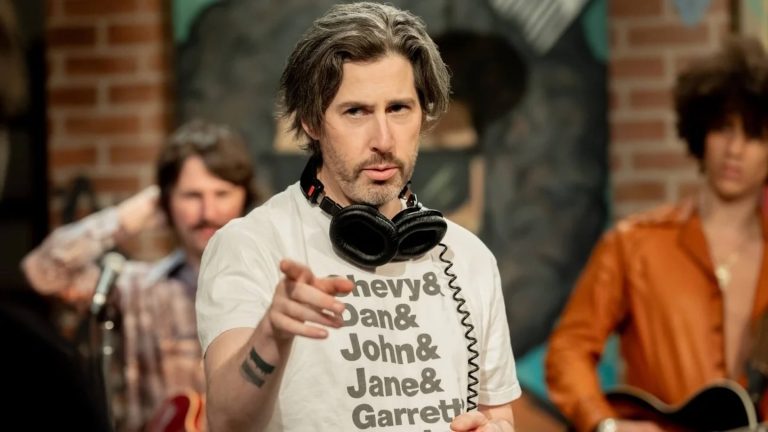Five Questions Screenwriters Should Be Ready to Answer

Are you going to be ready when development executives, producers, managers, and agents ask you the most common questions posed to screenwriters in emails, phone calls, and meetings?
When you've managed to break through some of those Hollywood walls, that's when the real work goes into overdrive as you begin to get replies to your email queries, get those first industry calls after a contest win, and get those coveted meetings with studios, production and management companies, and agencies.
You need to know what questions they'll be asking you and then you need to prepare yourself with the best possible answers. Knowledge is power and preparation is the key to success.
Here we share the most common questions that you will face in those situations — and then we'll help you to find the right answers.
"So, can you tell me a little about yourself?"
This is often the opener of most industry calls and meetings. While it may seem like nothing more than an icebreaker, there's a little more to it than that. They want to know what type of Hollywood experience you have — how green you really are. Believe it or not, no matter how cold and calculating that sounds, most insiders are friendly and conversational. However sugarcoated it is though, that's really what they want to know.
Screenwriters often make the mistake of going into detail about their life outside of screenwriting. This question isn't an invitation to dictate your biography. They want to get a sense of you, yes, but they really want to know how your personality relates to the screenwriting.
The best you can do is be prepared to summarize your experience as a screenwriter as best you can, and wrap that in with inspirations and any individuality that you may have. Avoid reading through your own resume of contest placements and jobs. Focus on elements that stand out. Those that may be conversation starters, impressive qualifications, or intriguing characteristics, backgrounds, and experiences that might make you stand out even more.
Before these meetings or calls, take the time to sit down and write a paragraph — no more than three hundred words. Cover the broad strokes of your story like you would for any short synopsis of a screenplay. But make sure it's your screenwriting career story. Here's an example:
"I'm from Wisconsin originally. I moved out to Los Angeles in 1999 to pursue screenwriting and worked my way onto studio sets as a movie extra, just to get a feel for what goes into a studio production. I interned for Randal Kleiser, the director of Grease, and later moved across the street from Sony Studios. I wanted to get behind those walls so I walked up to a security guard and asked them how I could do what they're doing. Two weeks later I was a security guard at Sony. Worked the VIP lot. Worked my way into an office position and then when I was making a Sony ID for an incoming development executive, I asked him if he needed a reader... and he did. Next thing I knew I was a script reader and story analyst getting paid by Sony. I eventually left to raise our newborn son while working on my writing at home. I nabbed a manager from a studio referral who read one of my scripts, which tracked well, and then I had meetings at most of the studios. By that time we had decided to move closer to family so we relocated back to Wisconsin. Ironically enough, I signed my first deal after moving 2,000 miles away from Hollywood — a deal with Lionsgate. Couple years after that, I was hired for a miniseries which was eventually produced with a name cast. I've had some additional assignments since and now I'm just taking my latest specs out, which led me to you."
That's roughly two hundred and sixty words or so. It covers the broad strokes of my story, offers some interesting and brief anecdotes, and showcases my qualifications at the same time. A verbal version of this for a call or meeting would be just a little looser, but it often works wonders.
If you don't have any direct industry experience, don't worry. You're there on that call or in that room for a reason. Just tell your story. And tell it honestly, void of any embellishments or outright fabrications.
But always be prepared for that question. It breaks the ice, yes, but it also gets them comfortable with where you've been and who you are in life and in the industry.
"We love the script. So where did the idea come from?"
There are many different variations of this question, but all of them point to one objective hidden within it — "Who are you as a screenwriter?"
Nobody knows where ideas come from. They don't really care. They're really just trying to get a peek into your process and how well you know your story.
The worst reply would be sheepish, "I don't know. It just came to me one day."
They want more than that.
"Well, one of my favorite films is Crimson Tide. But I'm also intrigued by realistic post-apocalyptic possibilities. So by the end of the movie, I was asking myself, 'What if they had launched their nuclear arsenal? What would have happened then?' That's where the concept started and I just built it from there. And I had always loved Lord of the Flies. So marrying that with this nuclear submarine crew that launched their weapons and destroyed the world as they knew it was the perfect pair. It became a story of survival while dealing with the guilt and repercussions of destroying the world as they knew it. Their family. Friends. Everyone. What would that do to that crew? Mentally. Physically. Especially as they're all stuck on the island that they're ordered to inhabit until surviving Allied ships arrive. But they never do. What would that do to a person?"
This was my own personal answer when I went to multiple meetings for a spec I had written — Doomsday Order. This type of answer gives them a peek into my process, what genres I'm interested in, what intrigues me as a writer, and how I construct a concept from next to nothing.
That's what they want to know and that's how you should answer. And as always, yes, you should be prepared by writing a short paragraph that you can read over and over until the broad stroke details are etched into your brain.
"Do you live in L.A.?" or "Are you willing to relocate?"
Whether it's "Do you live in Los Angeles?" or "Are you willing to relocate?", these questions are more common than you'd think, especially if you're talking with managers and agents.
The details of your geographical location may come into question early on in the process — often through email. If you do live in Los Angeles, wonderful. If you don't, it can be a red flag to some — but not all — managers and agents. The reason being is that managers and agents want to be able to take their new prospects out on the town for water bottle tours — referring to the stream of seemingly endless meetings at production companies and studios that are looking for writers and scripts. And they'll always offer you bottles of water upon your arrival — hence the term water bottle tours.
So, yes, it's a vital question to many. If you want to be a television writer, you have to answer YES to either of those questions. There's no way to write for television when you can't be in that writers room in either Los Angeles or New York. But for features, there's certainly some leeway.
Regardless, you need to be ready to answers those questions.
"I actually relocated back to my home state of Wisconsin so we could raise our kids close to family. But I always fly back to Los Angeles for meetings when needed."
Be short, sweet, and to the point. If moving to Los Angeles isn't an option for you, it's not a deal breaker for the pursuit of this dream. It's just another hurdle that you'll have to overcome. Don't be scared off by the question — just be honest. If they're not interested in out-of-towners, it's their loss, right?
Note: If you can live in Los Angeles, it's a heck of a lot easier in the long run.
"What type of scripts do you want to write in your career?"
The variations of this question are aplenty, but they all point to one unsaid question that they're really trying to get an answer to — "Does what this screenwriter want to do match with what we want them to do?"
What's your niche? Where are you willing to go? Are you comfortable handling challenges? What if they don't want to make your script but they're interested in hiring you for something else? Is that okay with you?
This is the point where you need to look into the mirror and ask yourself, "What do I want to write if and when my career takes off?"
To answer this question, you need to ask yourself many questions like that and find truthful answers. Answers that will help them gauge if you are the right fit for them or not.
Before the meeting, do your research. Learn about the people that you're going to be speaking with. What types of films do the studio or production company make? What types of writers do the management company or agency represent? Get a feel for their credits and what sandboxes they like to play in as far as genre, subject, budget-type, and demographic.
In your answer, give them a mixture of what they want and what you want.
"I love writing action and am known for doing that, but I'm also interested in psychological thrillers and keeping people on the edge of their seats through suspense and mindf***s. Those are my two go-to genres that I love to write and love to watch."
If you're too specific about what you want to write, you've cornered yourself into one single label. If you're overly broad in what you want to write, you'll come off as having a lack of focus with respect to your career. So the key is to find a perfect hybrid statement of what you love to write and what they may want you to write — based solely off your research and looking into that mirror.
"What else do you have?"
This is perhaps the most common and most important question that you will be asked. What they're really trying to determine is — "Are you a one-hit wonder or newbie?"
Sure, they may also be interested in what other scripts you may have. The fact is, the script that got you the call or got you into that room might just be a calling card. Something that isn't right for them then and there, but something that makes a big enough impression to warrant some further exploration.
If you don't have any other scripts to showcase, there more than likely will never be a follow-up — unless they are utterly enthralled with your script and ready to invest millions into it. That doesn't happen as often as we screenwriters would hope.
That's why it is so important to come into the conversation with a stacked deck of quality scripts. Years ago when I first started getting meetings, I didn't have anything else.
"Doomsday Order is kind of my marquee script right now. I have a couple of concepts I'm developing..."
When I took that script out, signed with a manager, and got all of those studio meetings, it was too much, too soon for me at that time. I had written a couple of screenplays before it, but they were horrible — they were those lessons that I had to learn.
The success of getting calls and meetings with industry professionals means nothing if you can't back up your writing with more samples. If you win a major contest, that's a victory for sure and the industry insiders that you may connect with may understand if you don't have more to offer.
However, imagine the impact you can make on them when you answer that question with three to five screenplay titles and concepts that are fully realized in final drafts that you can forward to them shortly after your call or meeting.
"So, can you tell me a little about yourself?"
"We love the script. So where did the idea come from?"
"Do you live in L.A.?" or "Are you willing to relocate?"
"What type of scripts do you want to write in your career?"
"What else do you have?"
These questions comprise the basic structure of nearly every Hollywood call or meeting that you — the screenwriter — will come across. These are the five questions that you need to have answers for. And the knowledge of what those questions will be will help you to be well-prepared with well-researched and well-thought-out answers to offer so you can slay that call or meeting with style and grace.
For some more tips on how to handle industry insider emails, calls, and meeting, read ScreenCraft's 16 Things Screenwriters Should Never Say to Hollywood Executives!
Ken Miyamoto has worked in the film industry for nearly two decades, most notably as a studio liaison for Sony Studios and then as a script reader and story analyst for Sony Pictures.
He has many studio meetings under his belt as a produced screenwriter, meeting with the likes of Sony, Dreamworks, Universal, Disney, Warner Brothers, as well as many production and management companies. He has had a previous development deal with Lionsgate, as well as multiple writing assignments, including the produced miniseries Blackout, starring Anne Heche, Sean Patrick Flanery, Billy Zane, James Brolin, Haylie Duff, Brian Bloom, Eric La Salle, and Bruce Boxleitner. Follow Ken on Twitter @KenMovies
For all the latest ScreenCraft news and updates, follow us on Twitter, Facebook, and Instagram.
Tags
Get Our Screenwriting Newsletter!
Get weekly writing inspiration delivered to your inbox - including industry news, popular articles, and more!



























